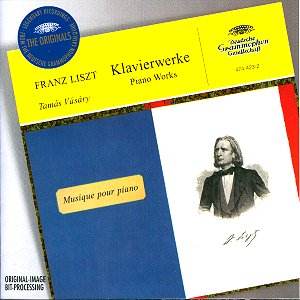Comparison recordings:
Don Juan Fantasy, Earl Wild Vanguard/Omega
Polonaise #2 in E, György Cziffra Philips
St. Francis de Paule marchant sur les flots, Erwin Nyiregyházi
(live 1974) IPA/Desmar
Rigoletto Fantasy, George Bolet IPA
Consolations, Catherine vanLoo N/A
Considering myself a serious Liszt student and
revering Tamás Vásáry as the very greatest
of pianists for Chopin,* I approached this disk with high expectations,
and I was not disappointed. Vásáry’s approach to
this music is to play it the way a pianist trained in the classic
tradition would have played it at the time it was composed. That
is, he plays Chopin as though it were Schubert, with amazingly
insightful results; and plays Liszt the way Clara Schumann would
have played it — remember that the Transcendental Etudes
were dedicated to her. What’s wrong with the way other pianists
play it? They approach from the wrong end, from the future as
it were, and consider the piano a tone painting instrument, a
primitive synthesiser, rather than a sort of softened up harpsichord,
and tend to overly shape phrases and tones. They throw a few notes
under the table for effect, and like to smear things out with
lots of pedal and lingering fingering, rather than clearly articulate
each and every note as written. This is not to say there aren’t
many magnificent Liszt interpreters in this situation, and the
argument of just how Liszt wanted his works played can go on forever
with Liszt not here to set things straight. But with Vásáry
we hear them as they were played, at least by pianists
other than Liszt. And certainly Liszt, too, at times, at the very
least in the early days.
One result of this is that Vásáry’s
St. Francis is at the opposite pole from the famous Nyiregyházi
pirate recording. That one all but ignores classical piano technique
to provide an almost orgiastic tone painting, while this one is
very clearly somebody playing a piano and you never for a second
forget it. Which is better? I wouldn’t be without either one.
The music of a genius by definition can embrace, in fact requires,
a multiplicity of approaches.
Vásáry’s Consolations are
beautifully and touchingly played—not so lovingly and reflectively
as Catherine vanLoo’s, although her timings are only very slightly
longer.
Vásáry’s is the best performance
of the Hungarian Rhapsody #15 I’ve ever heard, and in fact all
of these performances are excellent and sufficiently close to
the best available to make this a highly recommendable release.
And the nice thing is there’s enough Vásáry in the
DG vaults for a volume 2! For those of you who enjoy the thrill
of the hunt, I’ve given a list of all time great performances
above, but they will tax the most determined of you as they are
long, long out of print. It’s probably best to look for them to
show up on "Great Pianists" or International Piano Archive
reissues. The vanLoo recording, one of the very, very finest,
is so far out of print I cannot find it listed in any catalogue
anywhere. Good Hunting!
*His Schubertian/Hoffmanian recording of the
Chopin’s four Scherzi is an amazing document, as they say,
a real eye-opener. So why hasn’t it been made available on CD?
DGG are you listening?
Paul Shoemaker
